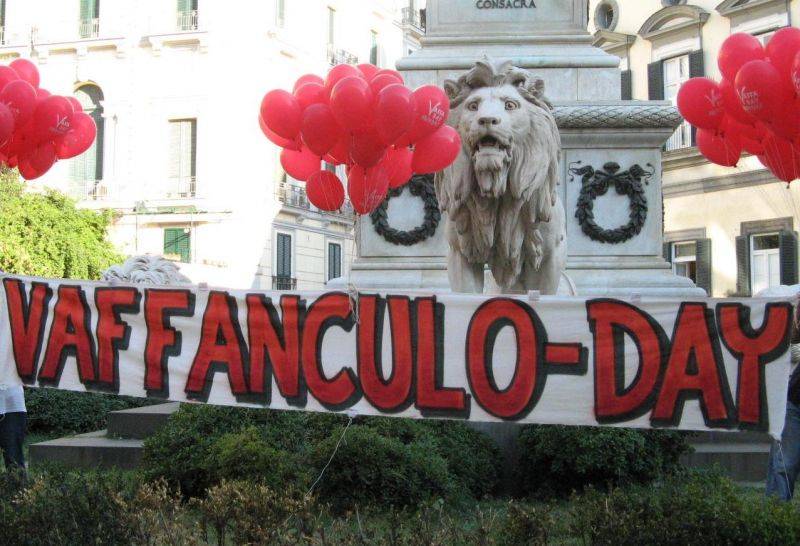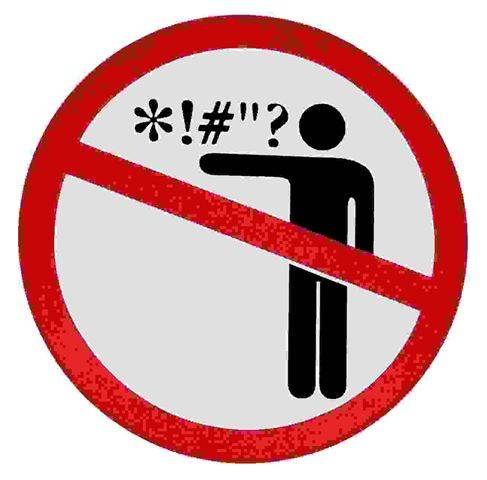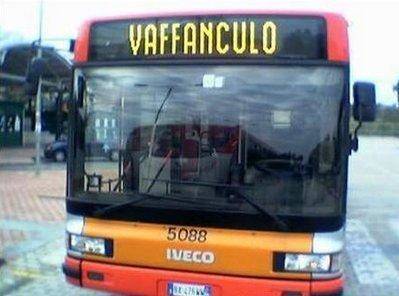When an Italian Says a Parolaccia
I hardly swear in English. After about the age of ten when my family in Oklahoma moved house and I lost touch with the dirty-mouthed little boy who lived across the street, my interest in words that shock abated. However living in Italy has changed my indifference somewhat. Maybe because swear words in Italian aren't meant to surprise, instead they are more compelling forms of personal expression that everyone uses in often humorous and very human contexts. Even politicians like Berlusconi freely expound profane language as a way of appearing more like everyday folk and less like aloof VIPs. In his case, it's yet another form of propaganda for attracting voters. During a political speech in 2006 he was quoted for saying he has too much esteem for Italians to think they would be "coglioni" and vote against their own interests. Coglioni are the male genitalia for which the equally indelicate English translation is balls, but his words could easily be interpreted as, "I do not believe that Italians are assholes and will, therefore, vote for the left." Sure Berlusconi is crude, but his supporters like it. They see him as a man who tells it like it is.
Take the famous Vaffanculo Day (V-day for short) held in Bologna's Piazza Maggiore last September and led by stand-up comedian and political activist Beppe Grillo. The event united fed-up Italian voters, fifty-thousand strong, who are tired of hosting a long-term, self-indulgent and lethargic government largely populated by old men who have outworn their stay, a number of whom include petty criminals and money launderers linked to the mob. Italians from all corners of the country gathered to sign petitions and holler "basta," especially considering Italian government officials are the highest paid in Europe while citizens' salaries are the lowest. And holler they did. Vaffanculo basically means "go screw yourself where the sun don't shine." I try to imagine such a revolutionary day in America. Would we call it, "Up yours day?" Similar slogans may appear on an individual banner in the U.S., and did recently during the Wall Street protests, but the likelihood of the country with its Puritan roots rallying behind a headliner like that is just as likely as President Bush calling the democrats pricks during a nationally televised speech.
What do Italians on the street say about a day for cussing out politicians? A man from Torino writes in a political blog that the "parolacce," or curse words, that Grillo uses are no different from what the average Italian would use while driving in traffic or while shopping at the supermarket. "Better curses than hypocrisy," he concludes. Another blog hosts a woman from Rome who says it's more important to speak the truth in whatever idiom than to worry about the appropriateness of it all. "Aren't we already getting screwed as it is?" she laments. The biggest difference between the Italian and American cultures in this regard is that Italians don't often take these expressions personally. The fact is that "Vaffanculo" is such a common expression in Italy today that it can also be said jokingly between friends and will ten times out of ten get a laugh. "Che cazzo dici?" (what the hell are you saying? -- "cazzo" actually means penis) is another. It's a kind of rough and tumble camaraderie that is particular to Italy since the same expressions translated into American English would most likely get you a slamming door on your backside or a slap in the face.
Sure, there are cutesy euphemisms that avoid the crass here too, but I've tried both – "cavolo," which means cabbage, instead of "cazzo" -- and have found that substitute words attract no less attention than the bolder ones do. Using the right curse word in the perfect moment is pretty much the same as having told a hilarious joke. People love it. The most famous of a battery of vulgar Bolognese expressions is "socmel" (suck me) or just "soccia" (suck). This expression is used by all in Bologna, including transplants, and I've even heard my eighty-year old neighbor who is a distinguished lawyer use both on vital occasions and I crack up every time. Would my American grandfather, who served in WWII and had his own variety of colorful 1930s lingo inspired by a mix of depression era country life and screwball cinema, have spontaneously said, "Oh, suck me!" upon having forgotten something he was supposed to do or after stubbing his toe. Not a chance!
Though "socmel" (pronounced SOACH-MEL) is definitely a gem and on the top of my list, my favorite expressions are the ones that blaspheme using the emphatic name of the pig or swine for starters. "Porca madonna," "porca miseria," "porca puttana" are the most common and are straightforward. There is also "porca eva," still blaming Eve for original sin, "porca troia," much like "porca puttana," and "porcata," something you don't want to hear, see, or do. Don't get these confused with "maiala," another name for female pig, which is an erotic woman. "Maialina" is the diminutive and sweeter, though is still an attractive and sexy little woman.
People who use these expressions come from all walks of life and represent both genders. Their children who adopt them at home and in the schoolyard are not sequestered into corners for punishment but, rather, are secretly lauded for their bravado. The Italian teachers I've met are more than happy to share their personal favorites, both in standard Italian and in dialect. Among the various dialects there must be three hundred or more names for the male and female genitalia. Why do Italians love to curse so much? The answer might be the same as why Italians love fast cars, actresses with big breasts, and ripped soccer players, regardless of their IQs. The Corriera Della Sera columnist Beppe Severgnini says that, "what everyone else thinks of as virtues are Italians' weaknesses" and that the ever important need to make a "bella figura" (a good show) is not the same as making a good impression. A gratifying gesture is more important than good behavior, which takes effort, too much after centuries of inhibition. Servignini calls this a "sophisticated exhibitionism" that has no need of approval. The author Leopardi claimed Italians make fun of everything because they respect nothing. Passion and humor are at the core of Italian society and, if those things might be considered irresponsible at times, Italians can always repent with a few Hail Marys and start again.
Eamee C. Lanning is a doctoral student in Comparative Literature at the University of Washington. She has just returned from a year abroad at the University of Bologna.







































i-Italy
Facebook
Google+
This work may not be reproduced, in whole or in part, without prior written permission.
Questo lavoro non può essere riprodotto, in tutto o in parte, senza permesso scritto.